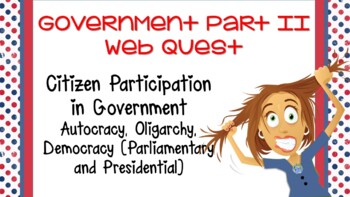Government Part II Web Quest, Citizen Participation, Distance Learning
That Crazy History Teacher
233 Followers
Grade Levels
4th - 12th, Homeschool
Subjects
Standards
CCSSRH.6-8.1
CCSSRH.6-8.2
CCSSRH.6-8.3
CCSSRH.6-8.4
CCSSRH.6-8.5
Formats Included
- Google Forms™
- Internet Activities
- Webquests
Pages
20 pages
That Crazy History Teacher
233 Followers

Made for Google Drive™
This resource can be used by students on Google Drive or Google Classroom. To access this resource, you’ll need to allow TPT to add it to your Google Drive. See our FAQ and Privacy Policy for more information.
What educators are saying
This was a great review! Students loved using their "internet skills" to research some of the answers. This is so easy to use and very well put together.
Description
This webquest is made in a Google Form which is so easy to assign and grade. The students also love them. It covers citizen participation in government. Specifically Autocracy, Oligarchy, and Democracy (Parliamentary and Presidential). I made this to use next school year at the beginning of the year as an introduction to government. Having the students find out what each of these forms of government are themselves works so much better than straight lecture. Meets the criteria for Georgia Standards of Excellence SS6CG1, SS6CG2, SS6CG3, and SS6CG4.
Total Pages
20 pages
Answer Key
Included
Teaching Duration
90 minutes
Report this resource to TPT
Reported resources will be reviewed by our team. Report this resource to let us know if this resource violates TPT’s content guidelines.
Standards
to see state-specific standards (only available in the US).
CCSSRH.6-8.1
Cite specific textual evidence to support analysis of primary and secondary sources.
CCSSRH.6-8.2
Determine the central ideas or information of a primary or secondary source; provide an accurate summary of the source distinct from prior knowledge or opinions.
CCSSRH.6-8.3
Identify key steps in a text’s description of a process related to history/social studies (e.g., how a bill becomes law, how interest rates are raised or lowered).
CCSSRH.6-8.4
Determine the meaning of words and phrases as they are used in a text, including vocabulary specific to domains related to history/social studies.
CCSSRH.6-8.5
Describe how a text presents information (e.g., sequentially, comparatively, causally).




